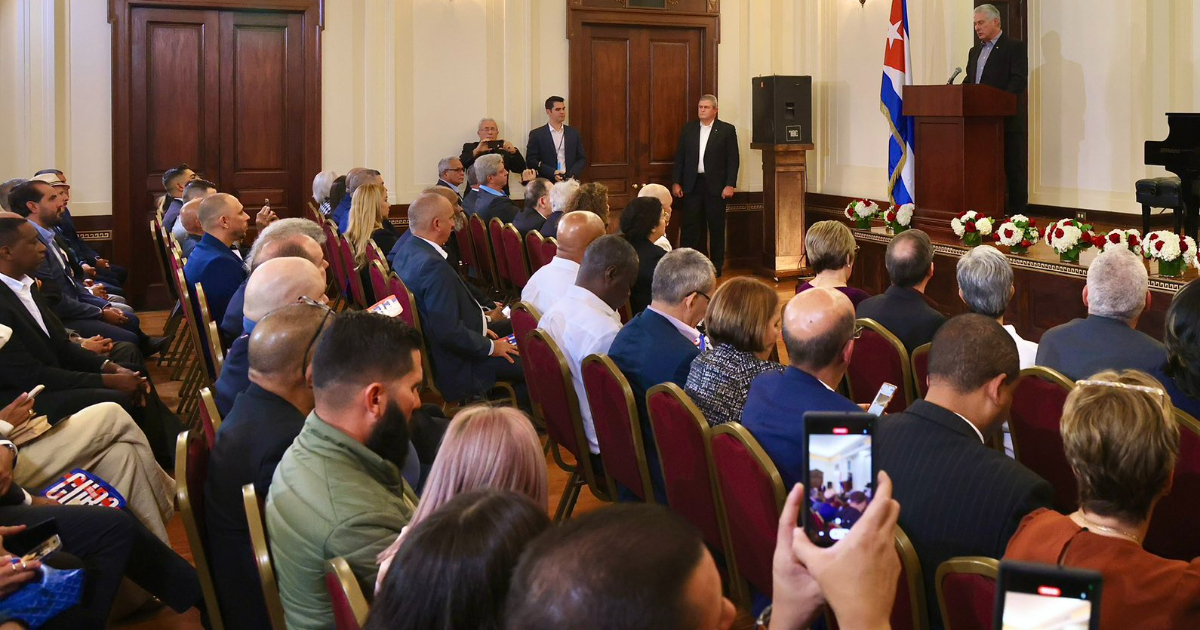
The Cuban regime would be exploring the possibility of allowing citizenscubanamericans to invest and own businesses in Cuba, in a desperate attempt to stop the serious crisis that is sinking the country's economy at an increasing rate.
This was revealed by Cuban officials during a meeting of the rulerMiguel Diaz-Canel with representatives of American companies and Cuban Americans from the Miami business community, as revealed in an article inThe New Herald.
We are “contemplating it and working on legislation to achieve it”Regime officials said this Friday to several people who asked them about that possibility during a closed-door event at the Cuban mission to the United Nations.
This is what the Miami lawyer told himRalph Patino, who was present during the exchange, to the journalist specialized in Cuban issuesNora Gámez Torres, who highlighted that this is not the first time that the Cuban regime flirts with this offer to a community that it rejects in the political sphere, but on which it depends economically.
“This is the dog that bites its tail, because the United States is waiting for them to take the first step, and they are waiting for the United States to take the first step,” Patiño said. “But I have a feeling that they know this is the only way to basically keep their country without something drastic happening.”
The lawyer, who supported efforts to collaborate with Havana during the change in Cuba policyBarack Obama, said that “if those ties had been allowed to flourish, Cuba would have been a different country in 2023.”
Despite previous signals to that effect, the Cuban regime has not yet issued specific regulations to allow foreigners, including Cuban Americans, to own or invest in small and medium-sized businesses, known asMSMEs, authorized for the first time in 2021.
Díaz-Canel alluded on his social networks to his meeting with American businessmen to discuss new business opportunities in Cuba and changes in the country's economy.
However, he did not mention that some of the businessmen were Cuban-Americans from Miami, such asMike Fernandez, Ariel Pereda, owner of a company that exports to Cuba, andHugo Cancio, owner of Katapulk, the largest online marketplace for MSMEs.
"For a long time we will not forget this Friday afternoon #September22nd at the headquarters of our @CUBAONU mission in New York. Outside the embrace of solidarity. Inside that of the Cubans who love the Homeland. #SomosCuba" with everyone and for the good of all," said the ruler in X.
In this way, he highlighted the "love of the country" of those who listened to him at the event, in contrast to the civil society actors who demonstrated during these days against him in the streets of New York.
During the meeting, the businessmen urged the Cuban government to eliminate obstacles to foreign investment and the growth of the private sector. Despite government control, the private sector in Cuba has grown and become a major importer of food and basic supplies, many of which are purchased from American companies.
was also presentCarlos Saladrigas, president ofCuba Study Group, an organization that says it has helped train thousands of Cuban entrepreneurs over the years. Representatives of the United States Chamber of Commerce,Western Union, the Crowley Shipping Company, andPaul Johnson, president of the United States Agricultural Coalition for Cuba, which represents nearly 100 member companies, were among those invited to the meeting.
TheBiden administration has focused its efforts on supporting the Cuban private sector andregulations expected to be announced soon that allow owners of private Cuban companies to open and operate bank accounts in the United States.
Additionally, according to the aforementioned media, a group of small Cuban businessmen are expected to visit Miami in search of business opportunities and to understand the US regulations that affect their businesses.
“While it was helpful that President Díaz-Canel created time in his schedule to meet with private sector representatives, the meeting was a missed opportunity to make progress,” he toldThe New Herald John Kavulich, president ofUS-Cuba Trade and Economic Council, who was informed of the conversations held.
In his opinion, the meeting “was a repetition of complaints instead of discussing in detail how to get more out of what is currently authorized” by US government agencies.
What do you think?
SEE COMMENTS (4)Filed in: